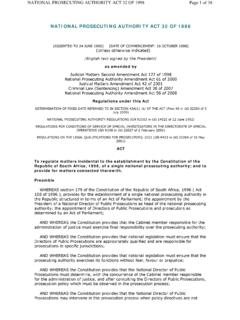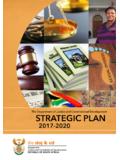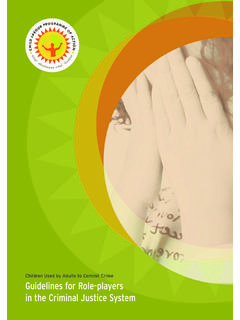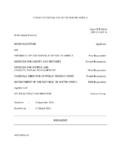Transcription of CONSTITUTIONAL COURT OF SOUTH AFRICA …
1 CONSTITUTIONAL COURT OF SOUTH AFRICA Case CCT 08/13 [2013] ZACC 37 In the matter between: DERRICK grootboom Applicant and national prosecuting authority First Respondent MINISTER OF JUSTICE AND CONSTITUTIONAL DEVELOPMENT Second Respondent Heard on : 23 May 2013 Decided on : 21 October 2013 JUDGMENT BOSIELO AJ (Moseneke J, Froneman J, Jafta J, Khampepe J, Mhlantla AJ, Nkabinde J and Skweyiya J concurring): Introduction [1] This is an application for leave to appeal against a decision of the Supreme COURT of Appeal refusing the applicant, Mr grootboom , special leave to appeal against BOSIELO AJ 2 a judgment of the Labour Appeal COURT . Effectively, the Labour Appeal Court1 endorsed his deemed discharge from employment by the national prosecuting authority (NPA). The deemed discharge was based on section 17(5)(a)(i) of the Public Service Act2 (Act).
2 This section allows for the deemed discharge, by mere operation of law and without prior notice or hearing, of any officer, other than a member of the military, police or correctional services or an educator or a member of the national Intelligence Services, who absents himself or herself from his or her official duties for longer than one calendar month without his or her employer s permission. [2] Essentially, the respondents case is that by going to the United Kingdom (UK) on a 12-month study programme whilst on suspension and without their permission, the applicant brought himself squarely within the section s purview and that he was correctly discharged. On the contrary, the applicant contends that, although most of the requirements of the section have been satisfied, the respondents failed to prove that by going to the UK on a scholarship for 12 months he had absented himself from official duties.
3 1 grootboom v national prosecuting authority and Another [2012] ZALAC 28; (2013) 34 ILJ 282 (LAC); [2013] 5 BLLR 452 (LAC). 2 103 of 1994. Section 17(5) of the Act has since been substituted by section 25 of the Public Service Amendment Act 30 of 2007, and is now subsection 17(3)(a) and (b) of the Public Service Act. There are no material differences between the two sections. The full text of section 17(5) is reproduced in [39][39] below. BOSIELO AJ 3 [3] This appeal therefore turns on the correct interpretation and application of the section. In other words, the question is whether all the jurisdictional requirements embedded in the section have been met. Background [4] This matter chronicles the long legal route travelled by the applicant from his initial suspension in 2005 to his appearance before us in 2013, a total of some eight years.
4 With the effluxion of time the matter morphed into an arduous legal battle starting when the applicant, who was employed by the NPA as a public prosecutor from April 2001, was suspended by the NPA on 22 June 2005 on allegations of misconduct. This was followed by a disciplinary hearing starting in September 2005, which culminated in the presiding officer imposing the sanction of dismissal on 21 November 2005. [5] Aggrieved by this decision, the applicant referred the dispute to the General Public Service Sectoral Bargaining Council for arbitration. On 1 June 2006, the parties settled the dispute. The findings of the disciplinary hearing were set aside and the matter was referred to a pre-dismissal arbitration. I interpose to state that throughout this saga, the applicant was, as part of his conditions of suspension, prohibited from coming to his place of employment, performing any duties for his employer or having any contact with the staff of the NPA unless authorised to do so.
5 BOSIELO AJ 4 [6] Whilst on precautionary suspension, the applicant was shortlisted by the Nelson Mandela Scholarship Fund for a 12-month scholarship to study in the UK. On 18 January 2006, he wrote an email to the NPA enquiring whether it would be willing to grant him provisional study leave for 12 months to enable him to pursue the scholarship. The NPA replied that the applicant s request would be granted, subject to the condition that such leave would be without pay. The explanation was that, in his absence, the NPA would have to employ a replacement who would have to be paid. A further condition was that the applicant had to complete the requisite leave [7] There was some delay in commencing with the pre-dismissal arbitration. After some frantic enquiries by the applicant, the pre-dismissal arbitration was eventually set down for 14 and 17 August 2006 (later amended to 16 and 17 August 2006).
6 The applicant complained that as he had not been given 14 days notice of the hearing, he had insufficient time to prepare. At his request the hearing was postponed indefinitely until he returned from his leave in the UK. [8] On 17 August 2006, the applicant went to the NPA s offices in Upington to complete and sign the requisite forms for his study leave. It seems that there was a disagreement between the applicant and his senior, Mr Engelbrecht, who insisted, 3 The NPA stated in an email as follows: Dear Mr grootboom It s a pleasure to inform you that after deliberation with management, it concluded that study leave for a year be granted to you upon official request, however, with certain conditions, that is leave be granted without pay, this is to enable the NPA to find a temporary replacement for your post. Other than that, normal forms should be processed following normal procedures.
7 BOSIELO AJ 5 contrary to the applicant s expectations, that the leave was to be without pay. The two could not agree and the applicant left the offices without having completed and signed the leave forms. [9] On 18 August 2006, the applicant left for the UK to pursue his 12-month study programme at the University of Southampton. The NPA continued paying his salary. It was only on 31 October 2006 that the NPA unilaterally and without any prior notice discontinued the applicant s salary. Dissatisfied with this decision, the applicant wrote an email to the NPA requesting that his salary be reinstated. [10] Instead of reinstating his salary, the NPA wrote an email to the applicant on 1 February 2007, advising him that in terms of section 17(5)(a)(i) of the Act, as he had not been granted permission to go on study leave outside the Republic, he was by operation of law deemed to have been discharged from the public service with effect from 15 September 2006.
8 This email is the genesis of this legal battle. Notably, the applicant was advised in the same email, that in terms of section 17(5)(b) of the Act, he had the right to make representations to the Minister of Justice and CONSTITUTIONAL Development (Minister) for his reinstatement. The applicant remained in the UK and continued with his studies. He only returned to the Republic on 30 July 2007. [11] Upon his return, the applicant, acting in terms of section 17(5)(b), submitted written representations to the Minister on 5 September 2007, in an attempt to show good cause for having gone away for 12 months on the study programme and to BOSIELO AJ 6 secure his reinstatement. The NPA replied by a letter dated 22 February 2008 advising him that the Minister has applied her mind to [his] representations and has upheld [his] deemed discharge by operation of law. Interestingly, the letter concludes by advising the applicant that he may seek a remedy to the decision from the High COURT .
9 Litigation history [12] The applicant instituted proceedings in the Labour COURT in terms of section 158(1)(h) of the Labour Relations Act4 to have his deemed discharge reviewed and set aside under section 6(2) of the Promotion of Administrative Justice Act5 (PAJA). [13] In dismissing the application the Labour COURT held, first, that in terms of section 17(5)(a)(i) the applicant was discharged by operation of law and that therefore the respondents had not taken any decision that could be reviewed and set aside in terms of PAJA. In other words, the respondents had not performed any administrative action. Second, it found that by going to the UK on a 12-month scholarship without the NPA s permission, the applicant had absented himself as envisaged by section 17(5)(a)(i). It reasoned as follows: In this respect the applicant contended that the [NPA] was aware that he would be leaving on a scholarship to study outside the country.
10 I have earlier in this judgment indicated that a suspended employee has a duty to inform his or her employer about 4 66 of 1995, read with section 157(2) of the Labour Relations Act. 5 3 of 2000. BOSIELO AJ 7 his or her whereabouts during the period of suspension and may have to seek permission if he or she is to be away in circumstances that he or she would not be able to resume duty if he or she was so directed by the employer. The fact that the employer had knowledge about his whereabouts is irrelevant as what is key is whether or not the absence was authorised. The facts of this case indicate very clearly that the applicant never received authority to be away for an excessive period of one year. The criteria for [invoking] the provisions of section 17(5)(a) of the [Act] [were] in my view satisfied and thus the [NPA] was entitled to [invoke] the provisions of that subsection.















